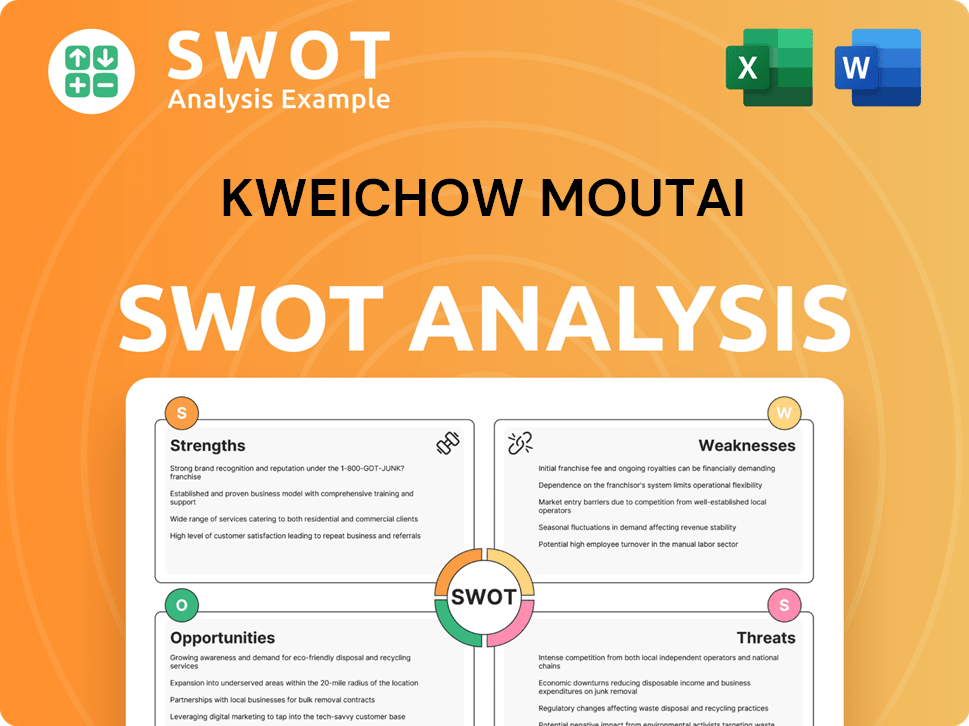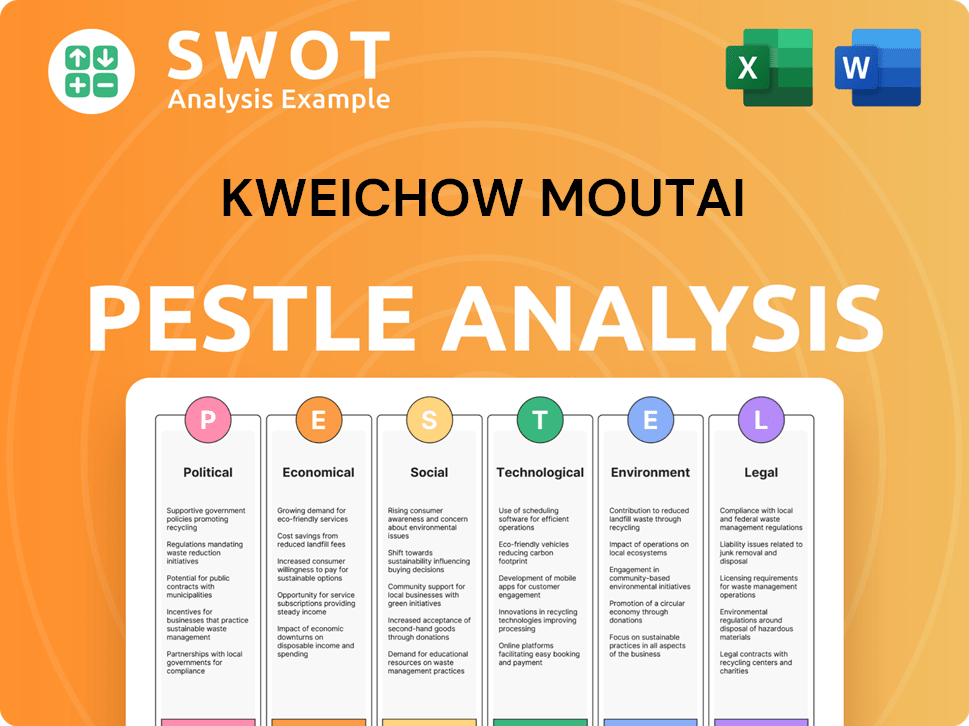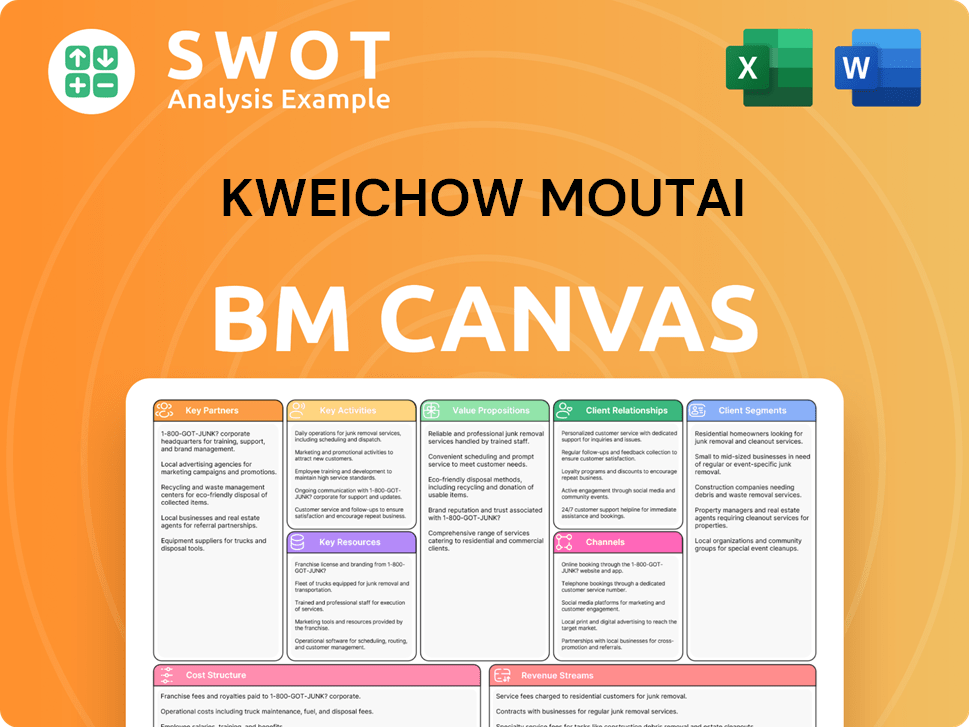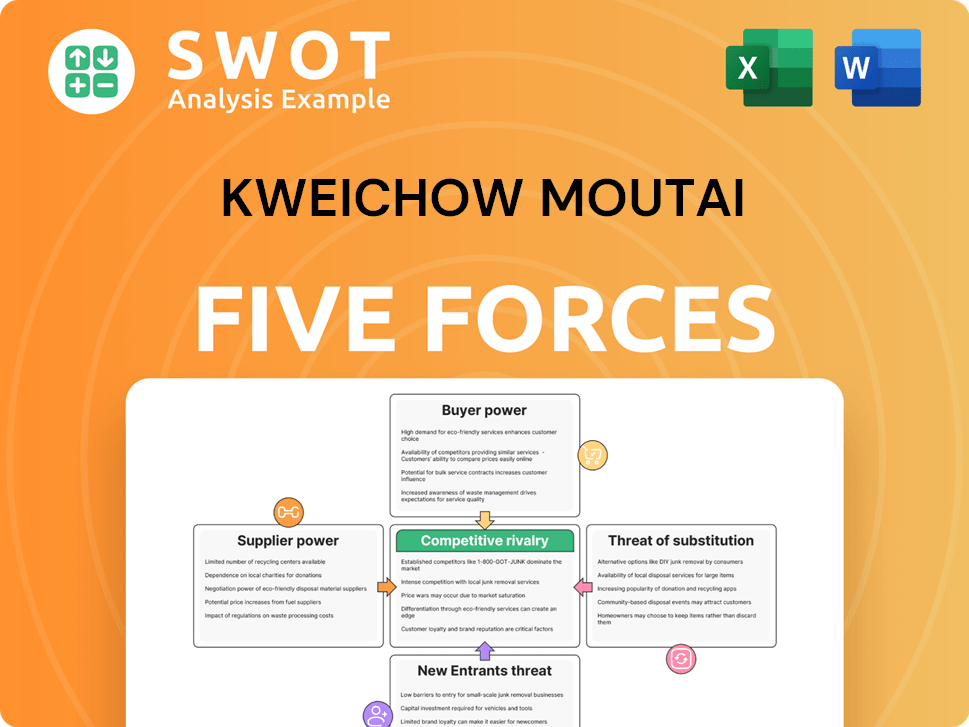Kweichow Moutai Bundle
Who Really Owns Kweichow Moutai?
Unraveling the Kweichow Moutai SWOT Analysis is just the beginning; understanding its ownership structure is key to unlocking the secrets of this baijiu behemoth. From its humble beginnings to its current status as a global luxury brand, the story of Who owns Moutai is a complex interplay of state control, market forces, and investor interests. Knowing who owns Moutai is crucial for anyone looking to understand the company's strategic direction and future prospects.

The Kweichow Moutai ownership structure is a critical factor for investors, analysts, and anyone interested in the Moutai company. Exploring the Moutai owner and the intricacies of Moutai shares reveals insights into its operations, market strategies, and long-term value. Understanding the Kweichow Moutai ownership history, including its state-owned enterprise roots, is essential for informed decision-making. This analysis will address questions like: Who is the largest shareholder of Kweichow Moutai? and Is Kweichow Moutai a state-owned enterprise?
Who Founded Kweichow Moutai?
The story of Kweichow Moutai's ownership begins uniquely, rooted in the consolidation of distilleries in Maotai Town by the Chinese government in 1951. Unlike companies founded by individual entrepreneurs, the 'founders' were the provincial and central government entities that orchestrated this state-led initiative. This structure set the stage for a company where ownership was vested in the state, shaping its trajectory and operational framework.
Initially, the Guizhou provincial government held primary control over the company's assets and operations, reflecting a centralized, state-planned economic model. There were no initial private investors or shareholders in the traditional sense. The capital and resources were provided by the state, setting the foundation for a state-owned enterprise.
The foundational vision, driven by the state, focused on standardizing and industrializing Maotai baijiu production. This aimed to elevate it to a national product and a symbol of Chinese culture. This strategic direction ensured that control remained firmly within state-affiliated entities, influencing the company's early development.
Kweichow Moutai's founding ownership stemmed from the Chinese government's consolidation efforts in 1951. The provincial and central government entities were the primary drivers behind this initiative. This state-led approach established a unique ownership structure.
The Guizhou provincial government initially oversaw the company's assets and operations. This reflected a centralized, state-planned economic model. The state provided all the capital and resources.
The state's early vision was to standardize and industrialize Maotai baijiu production. This aimed to elevate the product to a national symbol. This strategic direction ensured state control over the company.
Unlike private companies, there were no individual founders with specific equity splits. The ownership was vested in the state from the beginning. This eliminated the need for early agreements or shareholder disputes.
Various governmental bodies oversaw the company's operations and development. This reflected the centralized economic model. The state's role was crucial in shaping the company's early direction.
The goal was to transform Maotai baijiu into a national product. This ambition was a key driver in the state's involvement. The state aimed to make it a symbol of Chinese culture.
Understanding the early ownership structure of Kweichow Moutai is crucial for grasping its evolution. The company's unique beginnings as a state-owned enterprise have significantly influenced its growth and current status. The absence of private founders and the strong governmental oversight set it apart from many other companies.
- Who owns Moutai: Initially, the state, represented by the Guizhou provincial government and central government entities, held ownership.
- Kweichow Moutai ownership history: The ownership structure has evolved, with the state maintaining a significant stake.
- Is Kweichow Moutai a state-owned enterprise: Yes, it began as and continues to be largely state-owned.
- Who founded Kweichow Moutai: The Chinese government, through the consolidation of distilleries, effectively founded the company.
Kweichow Moutai SWOT Analysis
- Complete SWOT Breakdown
- Fully Customizable
- Editable in Excel & Word
- Professional Formatting
- Investor-Ready Format

How Has Kweichow Moutai’s Ownership Changed Over Time?
The ownership structure of Kweichow Moutai has evolved significantly, primarily due to its transition from a state-owned enterprise to a publicly listed company. The pivotal moment was the initial public offering (IPO) on the Shanghai Stock Exchange in 2001, under the ticker 600519. This event opened the doors for public investment, but the state retained a controlling interest.
The IPO was a strategic move that allowed the company to raise capital and increase its market presence. However, the state's dominant role has been a constant factor, ensuring that the government maintains control over the company's strategic direction. This has been key to the company's long-term stability and focus on brand value and market leadership.
| Event | Impact | Date |
|---|---|---|
| Initial Public Offering (IPO) | Allowed public investment, increased market exposure. | 2001 |
| Ongoing State Control | Maintains strategic direction and stability. | Ongoing |
| Institutional Investment | Increased investor confidence and market capitalization. | Ongoing |
Currently, the largest shareholder of the Moutai company is Kweichow Moutai Group, a state-owned enterprise under the Guizhou Provincial People's Government. As of early 2025, Kweichow Moutai Group holds approximately 54% to 55% of the company's shares, ensuring the government's control. Other significant stakeholders include institutional investors, both domestic and international, holding substantial portions of the publicly traded Moutai shares. Major institutional investors include state-backed investment funds and global asset managers, reflecting confidence in the company's growth prospects. Understanding who owns Moutai is crucial for investors and stakeholders alike.
The ownership structure of Kweichow Moutai is primarily characterized by state control, even after its IPO.
- Kweichow Moutai Group, a state-owned entity, is the largest shareholder, holding around 54% to 55% of the shares as of early 2025.
- Institutional investors also hold significant portions of the publicly traded Moutai shares.
- The state's dominant influence ensures strategic stability and a focus on brand value.
- Understanding the ownership structure is vital for anyone interested in Moutai shares.
Kweichow Moutai PESTLE Analysis
- Covers All 6 PESTLE Categories
- No Research Needed – Save Hours of Work
- Built by Experts, Trusted by Consultants
- Instant Download, Ready to Use
- 100% Editable, Fully Customizable

Who Sits on Kweichow Moutai’s Board?
The Board of Directors of Kweichow Moutai reflects its unique ownership structure, with a significant presence of representatives from its major state-owned shareholder. As of late 2024 and early 2025, the board typically includes a mix of executive directors, non-executive directors representing the Kweichow Moutai Group, and independent directors. The Chairman of the Board, who often also serves as the Party Secretary, is typically a key figure appointed by the provincial government, directly linking the company's leadership to its state ownership. Other board members often include senior executives of the company, as well as individuals with backgrounds in finance, law, or industry, some of whom may be appointed with input from the controlling shareholder. Understanding who owns Moutai is crucial for investors and stakeholders.
The composition of the board ensures alignment with both corporate objectives and the broader strategic goals of the Guizhou Provincial People's Government. This structure is a key aspect of the Kweichow Moutai ownership model, influencing decision-making and corporate governance. The presence of independent directors helps to balance the interests of various stakeholders, ensuring transparency and accountability within the company. The board's role is pivotal in overseeing the company's operations and strategic direction, reflecting the influence of the Moutai owner.
| Board Member | Title | Affiliation |
|---|---|---|
| Ding Xiongjun | Chairman | Kweichow Moutai Group |
| Li Jingren | Director | Kweichow Moutai Group |
| Wang Yan | Director | Kweichow Moutai Group |
The voting structure of Kweichow Moutai follows a one-share-one-vote principle for its publicly traded shares. However, the Kweichow Moutai Group, by virtue of its majority shareholding (around 54-55%), exercises dominant voting power. This means that while individual and institutional investors have voting rights, the state-backed parent company effectively controls the outcome of major shareholder resolutions, including the appointment of board members and approval of significant corporate actions. There are no indications of dual-class shares, golden shares, or other special voting rights that would grant outsized control to specific individuals or entities beyond the direct shareholding percentages. The company operates within a market-oriented framework, the overarching control by the Guizhou Provincial People's Government through the Kweichow Moutai Group ensures alignment with national and provincial economic objectives. For those interested in the company's origins, a Brief History of Kweichow Moutai provides valuable context.
The Guizhou Provincial People's Government, through the Kweichow Moutai Group, maintains significant control.
- The Chairman is often appointed by the provincial government.
- The voting structure is one-share-one-vote, but the parent company holds the majority.
- The board includes representatives from the Kweichow Moutai Group.
- Independent directors ensure a degree of balance.
Kweichow Moutai Business Model Canvas
- Complete 9-Block Business Model Canvas
- Effortlessly Communicate Your Business Strategy
- Investor-Ready BMC Format
- 100% Editable and Customizable
- Clear and Structured Layout

What Recent Changes Have Shaped Kweichow Moutai’s Ownership Landscape?
Over the past few years (2022-2025), the ownership of Kweichow Moutai has remained largely stable. The state-backed parent company, Kweichow Moutai Group, continues to hold a dominant position. While there have been some share buybacks aimed at boosting shareholder value, these have not significantly altered the overall ownership structure. There have been no major secondary offerings or significant mergers and acquisitions that would dilute state control. Recent leadership changes, such as appointments of new chairmen in 2024, are closely watched for potential shifts in strategic direction, including marketing and distribution strategies.
Industry trends in China emphasize state-owned enterprise reform, which aims to improve efficiency while maintaining state control. For Kweichow Moutai, this means balancing market-driven growth with government policies. Despite increased institutional ownership of Moutai shares, the state's controlling stake has been minimally diluted due to the company's strategic importance and profitability. There have been no major activist investor campaigns or governance controversies challenging state control. Public statements and analyst reports consistently affirm the stability of its ownership structure, with no immediate plans for privatization or a significant reduction in the state's controlling stake. This reinforces its position as a strategically important state-backed enterprise in China's consumer market. If you want to understand more about the company's business model, consider reading Revenue Streams & Business Model of Kweichow Moutai.
| Metric | Value | Year |
|---|---|---|
| Market Capitalization (approx.) | $300 billion USD | 2024 |
| State Ownership (approx.) | Over 60% | 2024 |
| Institutional Ownership (approx.) | Around 20% | 2024 |
The primary owner of Kweichow Moutai is the state, through its parent company, Kweichow Moutai Group. This ownership structure highlights the strategic importance of Moutai within China's economy. The company's stock ownership structure reflects a blend of state control and public investment, with a significant portion of shares held by institutional investors. Key executives are appointed by the government, ensuring alignment with national strategic goals. The company's headquarters are located in Renhuai, Guizhou Province, China. Its shares are publicly traded, allowing for investment, but the state maintains control.
The state, through Kweichow Moutai Group, is the primary owner.
Yes, it is a state-owned enterprise.
The state, via its parent company, maintains control.
Shares can be purchased on the stock market.
Kweichow Moutai Porter's Five Forces Analysis
- Covers All 5 Competitive Forces in Detail
- Structured for Consultants, Students, and Founders
- 100% Editable in Microsoft Word & Excel
- Instant Digital Download – Use Immediately
- Compatible with Mac & PC – Fully Unlocked

Related Blogs
- What are Mission Vision & Core Values of Kweichow Moutai Company?
- What is Competitive Landscape of Kweichow Moutai Company?
- What is Growth Strategy and Future Prospects of Kweichow Moutai Company?
- How Does Kweichow Moutai Company Work?
- What is Sales and Marketing Strategy of Kweichow Moutai Company?
- What is Brief History of Kweichow Moutai Company?
- What is Customer Demographics and Target Market of Kweichow Moutai Company?
Disclaimer
All information, articles, and product details provided on this website are for general informational and educational purposes only. We do not claim any ownership over, nor do we intend to infringe upon, any trademarks, copyrights, logos, brand names, or other intellectual property mentioned or depicted on this site. Such intellectual property remains the property of its respective owners, and any references here are made solely for identification or informational purposes, without implying any affiliation, endorsement, or partnership.
We make no representations or warranties, express or implied, regarding the accuracy, completeness, or suitability of any content or products presented. Nothing on this website should be construed as legal, tax, investment, financial, medical, or other professional advice. In addition, no part of this site—including articles or product references—constitutes a solicitation, recommendation, endorsement, advertisement, or offer to buy or sell any securities, franchises, or other financial instruments, particularly in jurisdictions where such activity would be unlawful.
All content is of a general nature and may not address the specific circumstances of any individual or entity. It is not a substitute for professional advice or services. Any actions you take based on the information provided here are strictly at your own risk. You accept full responsibility for any decisions or outcomes arising from your use of this website and agree to release us from any liability in connection with your use of, or reliance upon, the content or products found herein.